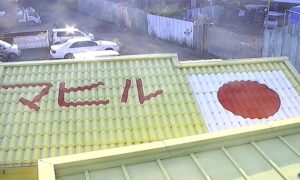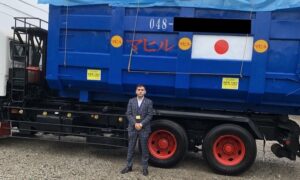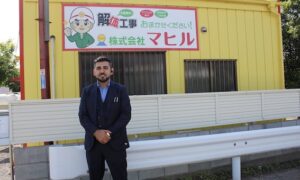A Kurdish man who loves Japan(Part 2)
松田 隆🇯🇵 @東京 Tokyo🇯🇵
最新記事 by 松田 隆🇯🇵 @東京 Tokyo🇯🇵 (全て見る)
- 24年後もサバイバー 中島瑞果(2)生き残るために - 2026年2月11日
- 24年後もサバイバー 中島瑞果(1)PTA会長”みずっち” - 2026年2月8日
- 文化人放送局が認否保留 著作権侵害訴訟始まる - 2026年1月25日
We present the second part of a series featuring an interview with Yugel Mahirjan (31), a Kurdish man living in Kawaguchi City. When asked about his thoughts on coexistence with the community, his thoughts on Japan, and his thoughts on the revision of the immigration control law, he made a shocking statement: “I want people who come to Japan and do bad things to return to their countries.”
◾️Actions for harmonious coexistence with local communities
In modern Japan, the importance of multicultural coexistence is widely recognized. With the increasing number of foreigners coming to Japan and forming communities, conflicts with local residents are inevitable. In such situations, it is crucial to embrace, understand, and respect each other’s cultures rather than isolating one another based on cultural differences.
It is evident that mutual understanding between both parties relies not only on the laws and regulations governing the area but also on the unwritten rules of the local community. Being a responsible member of the local community, despite cultural differences, is essential. Unfortunately, in Kawaguchi City and Warabi City, some foreigners are not adhering to these local rules. Mr. Mahirjan emphasizes that he is actively working to address this issue and promote coexistence with the local community.
— What kind of activities are you doing to coexist with the local community?
Mr. Mahirjan (hereinafter referred to as Mahirjan): I participate in weekly garbage cleanup activities in Warabi City with people from the company (Mahiru Co., Ltd., headquartered in Kawaguchi City). I also pick up trash and remove weeds outside the company premises.
— Are you doing these things to contribute to the community?
Mahirjan: Absolutely. Our neighbors also observe our actions. At the request of our neighbors, we help maintain roads (considered private roads). However, even when we engage in community activities, if a few individuals with inappropriate behavior happen to be foreigners, it unfortunately tarnishes the reputation of all foreigners.
— Are other foreigners doing this?
Mahirjan: I don’t think so. We are the only ones doing it. My grandfather once said, “Even after I pass away, I want you to remember that my essence continues through this place. If you have the desire to give back to your hometown, where you reside, don’t just spend money but take actions that benefit the community.” Those words left a strong impression on me and became one of the reasons why I engage in such activities.
◾️ “How many times have we quarreled…”
Achieving coexistence between Kurdish people and local communities, particularly in places like Kawaguchi City, cannot be solely attributed to the efforts of Mr. Mahirjan. In reality, many residents in the city believe that there are nuisance behaviors exhibited by Kurdish people (which Mr. Mahirjan attributes to Turkish people). As of January 11, 2022, there are 1,382 Turkish nationals residing in Kawaguchi City, and it is crucial for them, along with other foreign residents, to share the same awareness as Mr. Mahirjan for the citizens of Kawaguchi to feel at ease.
Naturally, Mr. Mahirjan alone cannot monitor the behaviors of all Kurds and Turks in Kawaguchi City, and he should not be solely responsible for their actions. I asked him about this particular aspect.
— Are you paying attention to Kurds and Turks in Kawaguchi City to follow the rules?
Mahirjan:I offer them various advice. For instance, I advise them to ensure their children attend school, instruct them not to linger in the park until late when their children are playing, remind them not to shout loudly in the park, and urge them to refrain from loitering in front of the convenience store. In Turkey, there is no custom of drinking alcohol at places like izakayas as there is in Japan. It is common for everyone to gather in parks or in front of their friends’ houses and drink the beer they brought along, so they end up doing the same in Japan. I tell them, “Stop doing that.” I have had numerous verbal disputes with them over this… Even when I say, “Don’t sit here” or “Don’t smoke here,” they respond with things like, “It’s none of your business” or “You’re not a police officer,” and it turns into an argument.
— Is the person you are talking to Turkish?
Mahirjan: There are Kurds and Turks who do not adhere to such minor etiquette violations. However, the number of etiquette violations has increased since the Turks started coming to Japan, around 2015. Nevertheless, I feel that the incidents have decreased as they have started gathering at newly established (Turkish and Kurdish) shops.
◾️The importance of teaching
Mr. Mahirjan doesn’t just focus on men; he also plans to invite women to participate in park cleanup activities with their children once a week. However, achieving coexistence between Kurds and the local community is not an easy task.
— Unfortunately, in Kawaguchi City, there are people who are not sure if they are Kurds or Turks, but they are causing trouble for the citizens.
Mahirjan: There are rules and manners in the region. I believe that both Turks and Kurds should work together to communicate with local people and take action to solve the problem. To that end, it is most important to teach those who do not follow the rules. I think it is best for us, who have been in Japan for a long time, to teach the Kurds and Turks about the rules of Japan and the region.

The company’s roof also features the depiction of the Japanese flag (Photo provided by Mr. Mahirjan)
During the interview, we happened to see on multiple occasions the scene where Mr. Mahirjan casually greeted the local residents around Mahir Corporation. This gave the author an impression that Mr. Mahirjan understands the importance of community engagement and coexistence, as evident from these encounters.
There is something special about Mr. Mahirjan’s love for Japan, which may be an extension of his efforts to coexist with the local community. His company has a large rising sun flag on its roof, visible on Google Maps. Additionally, when volunteers deliver relief supplies, they adorn their trucks with large Japanese flags.
— Why do you draw the Rising Sun flag on the bodies of trucks and the roofs of your company?
Mahirjan: It’s because I love Japan. I am who I am today because I was in Japan. Thanks to the country of Japan, I was able to have a family and adorable children. Therefore, I have to give back to Japan. I feel like I owe a lifetime debt to Japan. I want Kurds and Turks who come to Japan to feel gratitude towards Japan. I also want Kurdish and Turkish children to become useful individuals for Japan.
◾️Demonstration at Tokyo Metropolitan Police
Some Japanese people may be impressed by Mr. Mahirjan’s words, but others may still find the actions of the Kurds unacceptable.
On May 30, 2020, 200 people, including Kurdish people protesting the incident in which a Kurdish man (then 33) was detained by the police, held a protest demonstration in front of the Metropolitan Police Department Shibuya Police Station. Many Japanese felt uncomfortable with these acts. This site also criticized the media that actually reported the demonstration positively (see: Kurdish issue heard at Shibuya police station… Stop biased reporting).
— Surrounding a police station as a group to interfere with their duties in protest against the legitimate execution of police duties is not acceptable.
Mahirjan: We didn’t participate in that demonstration. The arrested man belonged to a different group. He lives in Nagoya, works in Tokyo, and has many (non-Kurdish) friends. So it’s not correct to say that “only the Kurds were involved.” (In general) we take care of our families. When something happens to someone, everyone comes together because we are family. However, it is not good to intrude in a way that interferes with the police’s duties in such cases. (The incident that triggered it) is not that serious, and I don’t think it’s appropriate to protest as a group just because one person was held down by a police officer.
— From this incident, some Japanese people may feel that it is impossible to live together with Kurdish people and that their values are too different.
Mahirjan: I spoke to the family of the arrested man and suggested that asserting their rights through the legal system would be better than surrounding the police station and raising protest voices. I believed that it was the correct route to take. However, it seems that after the video depicting the circumstances that led to the incident spread online, his family became conscious that the method I mentioned was not appropriate.
— So, you believe that such forms of protest are not good, don’t you?
Mahirjan: I don’t agree (that such an approach is correct).
◾️ I want people who do bad things to go back to their country
Mr. Mahirjan, who passionately speaks about his feelings towards Japan, faces the possibility of forced deportation under the amended Immigration Control Act. When asked about his prospects, he responded, “The situation is tough.” However, he continues to remind the people around him not to forget their feelings towards Japan.
Mahirjan: What I said to my colleagues when this bill was proposed was, “I can’t stay in this country anymore, and I won’t be able to live a peaceful life.” I told them, “If you truly love Japan, follow the rules, do as you’re told, and if you want to oppose the bill (by engaging in actions like demonstrations), make sure to obtain permission and then proceed.” I also said, “Children should write letters to the immigration authorities to express their thoughts.” What I mean to say is, “If you truly want to be in this country, you have to make an effort,” and I’m telling them to “prove that you genuinely love this country.”
— Revision of immigration laws is not just for Kurds, is it?
Mahirjan: I do not complain about people coming from specific countries. As my wife is from South America, I understand their circumstances. I feel that there are examples of South American residents in Japan, who have permanent residency but receive social welfare even though they don’t actually need it. I don’t see them giving back to Japan. It is true that we, who don’t have permanent residency or visas, are not as fortunate as them. We also want to be recognized in Japan like they are. However, I don’t believe that claiming “recognize us because we are refugees” is the right approach to gain recognition. Instead, we should abide by the rules, pay taxes, refrain from doing wrong things, and fulfill our responsibilities. By doing so, I believe the immigration authorities will surely take notice. We don’t need foreigners who come to Japan and engage in harmful activities. Such people should go back to their home countries. If the immigration office showed me a list of Kurdish and Turkish people now, I could say, “We don’t need this person, or that person” (laughs). We don’t need people who don’t contribute to Japan.
Mr. Mahirjan says that Japanese people often say, “I wish there were 2-3 people like you.” However, he himself may face deportation under the amended immigration law. As long as Japan is a country governed by the rule of law, it cannot be helped.
Nevertheless, regardless of our personal opinions, we should listen to people’s voices and not neglect their perspectives. Multicultural coexistence begins with understanding one another. We should recognize that this approach does not conflict with the strict enforcement of the law.
(end)
[Back to Part 1]
*This article is a translation of a Japanese article written by the author, using a translation system, and subsequently checked. If there are any differences in meaning between the original text and the translation, the original text takes precedence.








